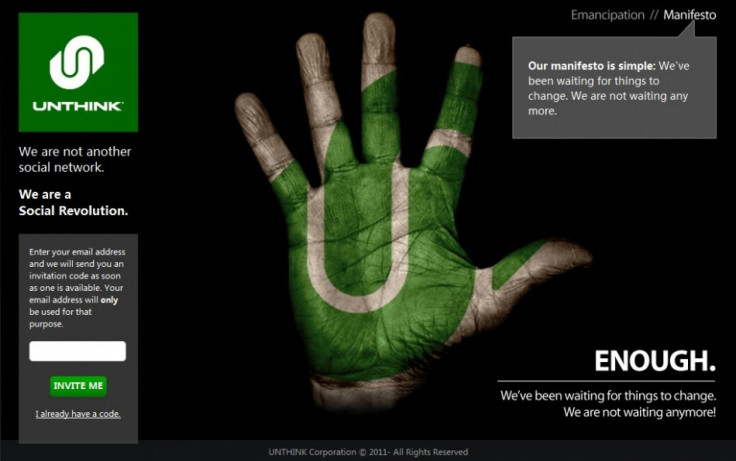Unthink: New Network Bills Itself as the Anti-Facebook

Unthink, billing itself as the anti-Facebook, launched Tuesday, with CEO Natasha Dedis going after the social media leviathan for invasion of privacy, deals with big advertising companies, and near-monopoly on online communication in general.
Unthink, which launched its beta testing model out of Tampa, Fla., has achieved a presence thanks to its YouTube campaigns against Facebook. Being the anti-Facebook is, in fact, what Unthink is all about and the inspiration for its founding.
Taking down Facebook is the core of Unthink's marketing campaign, TechCrunch reports, and for Dedis, the reasons are very personal.
Dedis first had a run-in with Facebook when her son begged her to let him join, protesting that he would be a social outcast if he were the only one of his friends without a profile. Reading over the terms of service, Dedis was unnerved by Facebook's reserving the right to change those terms at any moment, as well as the way the social networking giant sold the data it collected daily to help companies with target advertising.
Unthink, Dedis' response, lets users select the advertising that appears on their pages by picking a brand to sponsor it, one that they feel comfortable supporting. Users who choose to be sponsored earn points for deals and discounts, but users also have the option to get rids of ads altogether, paying $2 a year for the privilege.
To Facebook, Google, LinkedIn: We Are a Social Revolution
Facebook users can download a free app that sends all their information over to the Unthink site. But Facebook isn't the only Internet giant that Unthink is looking to take on.
If you watch Unthink's YouTube videos, especially the eloquently titled It's FU Time, or browse the sections into which Unthink is divided -- iUnthink, a social section, an advertising section and a professional section -- users will notice Unthink is also gunning for Groupon, LinkedIn, and some aspects of Google+.
We are not another social network, Unthink's site reads. We are a Social Revolution.
This activist side to social media is something very close to Dedis' vision. Discussing Unthink's mission, and the problem with how Facebook dominates online communication, Dedis references the 1967 coup led by Georgios Papadopoulos and the colonels in her native Greece.
The first thing they did was take down the communications systems, Dedis said in an interview with The Star. They then controlled communications for seven years. Facebook has the potential for the same kind of control, to be a cyber-dictatorship.
Dedis' rhetoric sounds extreme, until a quick scan is made of Facebook privacy concerns over the past few years.
Various features the Mark Zuckerberg creation has launched, from mobile check-ins and advertising deals to automatic integration with other Web sites and increasingly convoluted privacy settings, have all got some Facebook users concerned that the social media network is doing more to shape their lives than they're doing to shape the site.
We worked hard for more than three years to research people's needs and present them with a solution that will empower them, Dedis's statement reads on the Unthink site. Our mission is to emancipate social media and unleash people's extraordinary potential. Our -- not so covert -- mission is to spark a social revolution. We believe in people.
And people seem to believe in Unthink. The site attracted more visits in its first two hours, when it was opened for invite-only beta testing, than it had planned for its first 30 days. The flood of visitors shut Unthink down several times, causing Dedis to add extra servers and revise the architecture. The site is bankrolled, meanwhile, with about $2.5 million in investments from venture capitalists.
Learning from Diaspora and Google Plus
Unthink is not the first social media site that thought it could take on Zuckerberg's Facebook.
In the spring of 2010, a decentralized networking site called Diaspora tried to capitalize on growing anti-Facebook sentiment. But over a year and a half later, Diaspora has only produced an unfinished alpha version of the site, and the developers, four former New York University students, are in desperate need of funds, asking those who've already signed up to donate even more to the fledging network.
A much bigger threat, Google, had a similar flop with the unveiling of Google+, which it hoped would lure dissatisfied Facebook users. Despite reasonable success, Google+ remains hopelessly overshadowed by Facebook, its confusing design and lackluster advertising causing few waves or much incentive to switch.
Unthink, however, seems to offer enough aesthetic similarities to Facebook, and ease of transfer in terms of information, to support its claim to be everything Facebook is not. The site's design is very clean and organized, and sports a green backdrop to counter Facebook's signature blue.
Unthink may not grow enough to challenge Facebook on any even level. Facebook site does have an estimated 800 million users, many of whom accept lack of privacy and status as advertising guinea pig in exchange for an easy, expansive way to connect and communicate around the world.
For those critics of Facebook, Google, and other mega-companies, however, Unthink may prove to be the start of a true Internet revolution. We have created version 1.0, Dedis said. The people will decide what comes next.
© Copyright IBTimes 2024. All rights reserved.




















